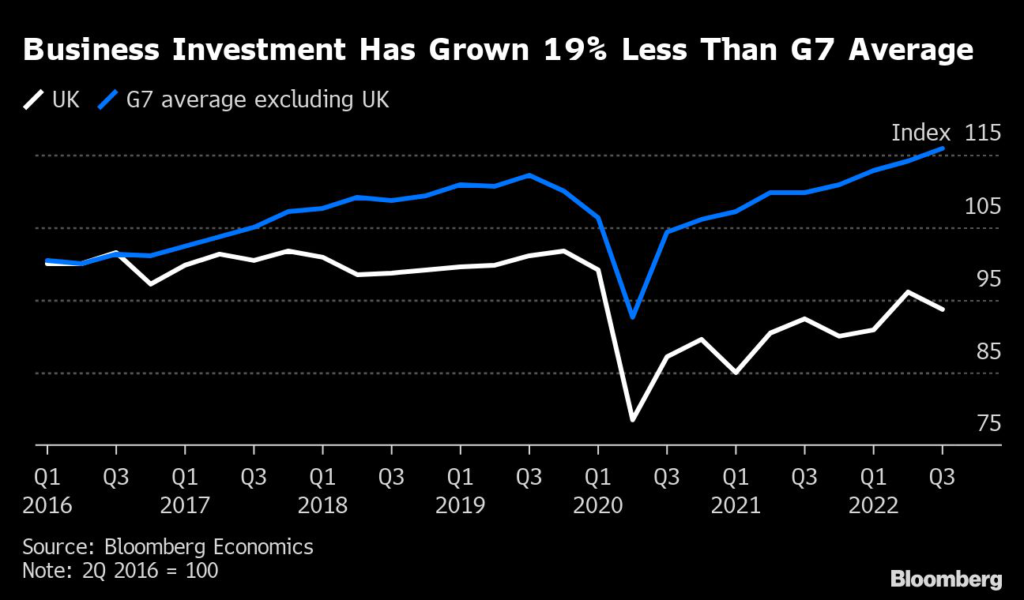A deal on the Northern Ireland protocol would unleash tens of billions of pounds in business investment for the UK, boost growth and hand the government more funds for public services or tax cuts.
(Bloomberg) — A deal on the Northern Ireland protocol would unleash tens of billions of pounds in business investment for the UK, boost growth and hand the government more funds for public services or tax cuts.
The conclusion by two prominent economists is a reminder of the economic fortunes at stake in talks about the post-Brexit trading arrangements for Northern Ireland. Concerns raised by the Democratic Unionist Party and hardliners in the ruling Conservative Party have left a potential agreement teetering.
British businesses have built up a cash warchest of about £100 billion ($121 billion) since the pandemic but investment has stalled due to uncertainty about the UK’s relationship with the European Union since leaving the trading bloc, said Kallum Pickering, an economist at Berenberg Bank UK.
“If you get rid of Brexit uncertainty, business can start to use some of this cash to invest,” Pickering said. “That will help sort out low growth. While the Irish border problem is alive, there is always the risk the UK could end up in a trade war with the EU.”
Karen Ward, European chief market strategist at JPMorgan Asset Management and a member of Chancellor of the Exchequer Jeremy Hunt’s economic advisory council, also believes an Irish border deal would deliver a significant boost to business investment and growth.
“Companies need certainty,” Ward said. “You can’t entice businesses to spend with low interest rates and tax incentives, it never does the job,” Ward said in an interview on Bloomberg Radio on Wednesday. “It would be really meaningful.”
“With investment, it solves all the other economic ills that we have, which is low productivity, low real wages, fiscal drag. It really is the secret sauce for economists, business investment.”
Prime Minister Rishi Sunak had been hoping to strike an agreement this week but Jeffrey Donaldson, who leads the DUP, said the terms were “not acceptable” since they would require Northern Irish businesses to align with EU regulations — even if they don’t leave Northern Ireland.
The government is keen to secure the backing of the DUP to ensure a deal is sustainable and remove any lingering uncertainty.
The Office for Budget Responsibility, the government’s fiscal watchdog, estimates that Brexit will knock 4% off the level of GDP, almost half of which has already happened. It’s expressed particular concern about the uncertainty that’s come with debate over the protocol.
Last March, the OBR warned there was “significant uncertainty around the longer-term operation of the protocol” and in November said business investment was being “held back … by elevated uncertainty” along with other factors.
Pickering said the economic rewards of an agreement could be substantial. He estimated that removing uncertainty could unleash investment growth of 10% a year, which would add as much as 0.5% to GDP a year and increase potential tax revenues.
Business investment stagnated after Brexit, having grown 40% between 2010 and 2016. There was no growth in business spending between 2016 and the pandemic in 2020, at which point investment crashed.
“I’ve become increasingly convinced that the bigger effect is the uncertainty effect,” Pickering said. “On trade, there has been a lot of switching from EU to non-EU trade and migration has proved stronger than expected.”
“So if you got rid of uncertainty over the Irish border – the final piece of the Brexit puzzle – you may get catch-up on business investment.”
He said an investment spree would be a textbook response in an economy facing constrained supply, like the UK, as businesses chase excess demand. The OBR would probably reflect that by upgrading Britain’s growth potential once there was evidence that the uncertainty is clearing, he added.
Ward added that the UK has fallen behind peers. “UK business investment is about the same level that it was in 2016. The likes of France and Spain – those numbers are around 20% higher,” she said.
The Treasury and the OBR declined to comment.
More stories like this are available on bloomberg.com
©2023 Bloomberg L.P.










